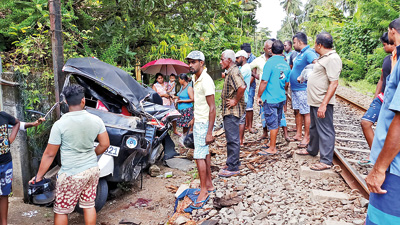News
Ask not for whom the bell tolls because nobody knows
Fatalities such as this week’s tragic deaths of a father and daughter at a level crossing will continue despite the government’s plans to install bell and light warning systems, railway authorities said, condemning the move as a waste of money.

A recent fatal collision at an unprotected railway crossing at Induruwa. Pic by Sarath Siriwardene
A 45-year-old father from Ja-Ela and his 11-year-old daughter were killed this week after their motorcycle collided with a train at the unprotected Wandurawa level crossing in the Veyangoda police division.
Earlier this year, another motorcyclist died – again at an unprotected crossing, in Tudella, Ja-Ela – when a train travelling from Chilaw to Fort crashed into him.
With such accidents increasing, the government says it will set up bell and light warning systems at most unprotected railway level crossings, with 200 installations to come in the first phase of the project.
“There are around 670 unprotected level crossings in the country and by 2020 we are hoping to set up at least 500 bell and light systems,” Deputy Minister of Transport and Civil Aviation Ashok Abeysinghe said.
“This is the most practical approach to reduce accidents as it catches the attention of both the sight and hearing of people. Moreover, this concept is practised all over the world,” he said.
Mr. Abeysinghe emphasised that many accidents at level crossings were caused by negligence and lack of discipline and said he hopes the introduction of a Rs. 25,000 fine for offences at railway crossings would change people’s habits.
Railway department officials, however, decry the government’s move. “The initiation of the bell and light system is not a successful project,” Railway Protection Force Superintendent Anura Premaratne said.
With the growing number of careless drivers the most suitable kind of protection on railway crossings are automated barrier gates, he said.
He claimed most accidents at protected crossings occurred at those with bell and light systems.
The cost of one bell and light system was Rs. 4 million, he said, and if accidents continued at such crossings it was impractical for the government to spend millions on a project that was not fruitful.
Assistant Superintendent of the Railway Protection Force G.W. Sumith agrees that barriers are the best safeguards at railway crossings.
“Not many people are aware of the bell and light system, especially in rural areas, and their excuse will always be that they were not aware of the functioning of the signals,” ASP Sumith said.
He also drew attention to the many unauthorised railway crossings that had no warnings or barriers, saying, “The major drawback is that when accidents take place no-one is aware as to who should be held responsible”.
Vehicle drivers must watch out for approaching trains at unprotected crossings and not expect trains to sound a warning, Locomotive Operating Engineers Union Secretary Indika Dodangoda said.
“The horns in the trains are used for communication codes to between the engine driver and the station masters: we do not use them to warn careless drivers or pedestrians,” he said.
He has often seen vehicle drivers try to beat trains at crossings or even break through barriers.
Mr. Dodangoda said that usually after an accident the engine driver is sent on compulsory leave for a day to be summoned by the police to give a statement and, if required, the leave can be extended for psychological treatment.
Vehicle-train collision have been rising steadily, from 84 in 2016, causing 14 deaths, 86 in 2017 with 12 deaths, 101 in 2018 with 13 deaths. In 2019, by June 30, there were 36 accidents, with five deaths.
Fatalities from pedestrian deaths as a result of being run over by trains are far higher – the numbers include suicides. Last year, there were 212 deaths from 466 incidents. In 2017, 180 deaths from 440 incidents, and in 2016, 180 deaths from 436 incidents.
Senior Professor Amal Kumarage of the Department of Transport and Logistics at the University of Moratuwa condemned the authorities for not modelling road safety standards on the aviation sector, where safety is number one. “Our country is at the primitive stage,” he said.
He said road agencies should conduct road safety audits and identify potential accident spots and mitigate future accidents.
Prof. Kumarage also raised concerns that no institution took responsibility for loss of life or property during accidents at level crossings.

